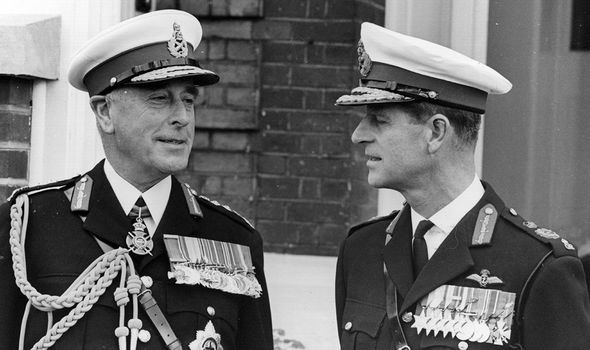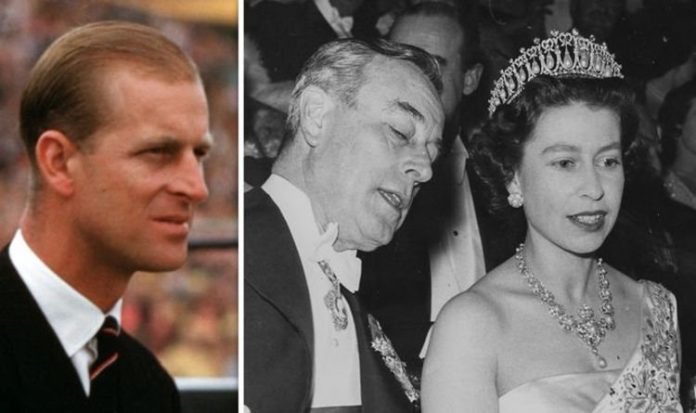Philip and the Queen are on the cusp of celebrating their 73rd wedding anniversary. Their marriage has become one of the most unshakeable parts of the Royal Family, especially considering the royal pressures they have faced. Princess Elizabeth reportedly fell in love with the young Greek prince when she was just 13 and he was 18.
However, their betrothal was not a certainty at the time, and they only exchanged a handful of friendly letters over the following years.
It was only when Philip went to stay with the Royal Family at Balmoral after World War 2 they started to seriously consider their lives together, the Duke admitted in a later interview.
Yet, there were some major obstacles in their way — Philip was still in line to the Greek throne and had familial connections with Germany.
So, his uncle Lord Louis Mountbatten — affectionately known as Dickie — waded in, to ensure Philip could become a naturalised British citizen.

Prince Philip, Lord Louis Mountbatten and Queen Elizabeth II (Image: Getty)

Lord Louis Mountbatten, Philip’s uncle, was a large influence in his life and romance with Elizabeth (Image: Getty)
He took his nephew to the House of Commons to meet younger MPs so he could win them over, and then he invited editors of the Daily Express and Sunday Express to drinks at his house.
Here, he introduced them to Philip and explained that his nephew wanted to be British due to his loyalty to the Royal Navy, dispelling any claims that the youngster was just preparing himself as a suitor to Elizabeth.
Royal biographer Ingrid Seward noted that Dickie’s attempts were successful, and when Philip’s naturalisation came through in March 1947, “there was no adverse comment in the press”.
Lord Mountbatten also insisted Philip became Lt Philip Mountbatten RN rather than take the name Oldcastle, which the College of Heralds had initially suggested.
However, at this point Philip felt his uncle had become too involved with his love life.
READ MORE: Prince Philip rebuffed claims ‘Lord Mountbatten raised him’

Philip’s uncle helped him become a naturalised British citizen which meant he was more eligible as a suitor to Elizabeth (Image: Getty)
Writing in her book, ‘Prince Philip Revealed’, Ms Seward recalled: “Philip felt that his flamboyant uncle was being overzealous in promoting the engagement and asked him to back off.”
Philip Ziegler, Dickie’s biographer, claimed that Philip wrote to his uncle and said: “Please, I beg of you not too much advice in an affair of the heart or I shall be forced to do the wooing by proxy …
“I am not being rude but it is apparent that you like the idea of being General Manager of this little show, and I am rather afraid that she [Princess Elizabeth] might not take to the idea quite as docile as I do.
“It is true I know what is good for me, but don’t forget she has not had you as uncle loco parentis, counsellor and friend as long as I have.”
Philip was relatively estranged from his parents as a child, with his mother Princess Alice being institutionalised and his father Prince Andrea living with a mistress in France.
DON’T MISS
Philip faced backlash as he was unable to shake off German links [INSIGHT]
Philip exposed fundamental flaw in monarchy amid Royal Family’s wobble [EXPLAINED]
Prince Philip’s greatest fear for life unveiled as 100th year nears [EXPOSED]

Princess Elizabeth during her 1947 wedding to Philip (Image: Getty)

Mountbatten remained a powerful figure behind royal lines, pictured here on Buckingham Palace balcony (Image: Getty)
As a result, he was sent to the UK and watched over by his uncles.
When he was 17, Dickie took a shine to him when he realised the young man’s potential.
He has been credited as an influential force in trying to set Philip up with Elizabeth years before they even became engaged.
However, Dickie then moved to India in his role as the nation’s last Viceroy in March 1947, knowing that by then he had done all he could to secure the Mountbatten name to the crown — Elizabeth was determined to marry him.

Philip and the Queen during the celebrations for their Platinum anniversary, in 2017 (Image: Getty)
Ms Seward noted: “Despite Philip’s impoverished circumstances,he had been accepted as one of the family and, far from being thought unsuitable, was considered easily the most ‘eligible’ candidate for the hand of the future Queen.”
However, the Mountbatten surname was not actually incorporated into the personal surname of the royals until 1960.
‘Prince Philip Revealed: A Man Of His Century’ by Ingrid Seward was published in 2020 by Simon and Schuster and is available here.







